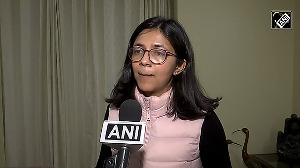A two-day SAARC ministerial meeting kicked off here today with Pakistan insisting on some mechanism within the grouping to resolve political differences and disputes, a veiled reference to Kashmir, while India called for collective efforts to eradicate terrorism from the region.
"Globally, the scourge of terrorism is plaguing many a nation. South Asia itself is a tragic example of this," External Affairs Minister K Natwar Singh told his counterparts from Pakistan, Sri Lanka, Bangladesh, Maldives, Bhutan and Nepal.
"We need to resolve, not to compromise with terrorism if we wish to realise the dream of South Asia as a region where boundaries cease to be barriers separating our peoples," he said. "What we need to do collectively in SAARC is to move towards closer cooperation at all levels, political, official and operational, if we have to eradicate terrorism from this region."
Opening the meet, Pakistan Foreign Minister Khurshid Mehmood Kasuri said "in visualising SAARC's future, we must give serious thought to devising way and means whereby political differences and disputes within the region are settled amicably."
The vision of South Asia joining the Asian mainstream for fast economic growth and development "can only be realised if there is peace and harmony. In this context, the resumption of composite dialogue between Pakistan and India is a welcome development," Kasuri said. "We are committed to making this process a success... this augurs well for SAARC and over 1.4 billion people of the region."
Echoing this, Pakistan's interim Prime Minister Shujaat Hussain he said he was happy to report that with "the vision and the will" of Pakistan under the leadership of President Pervez Musharraf, "we have embarked upon making a meaningful effort to resolve all differences and disputes with India, including the issue of Jammu and Kashmir."
"I want to assure all members of SAARC and indeed the world that Pakistan is committed to pursuing peace with India," he said. "Let us resolve that SAARC must become a symbol of peace and progress, not only to ensure stability in South Asia but to win hearts and minds of people of this region."
Singh also proposed setting up of a SAARC Parliamentary Forum "that could meet periodically to deliberate on issues relevant to our regional cooperation endeavours," and suggested that India host a conference on HIV/AIDS during the SAARC Awareness Year.
Singh, who is scheduled to meet Pakistan President Pervez Musharraf and Hussain besides holding talks with Kasuri, said South Asia was not immune to the "over-arching dynamic of conflict."
He also proposed that the member states set up SAARC High Economic Council comprising Finance and Commerce Ministers to promote collaborative ideas and initiatives in economic, trade, investment, financial and monetary areas.
Favouring the creation of SAARC Infrastructure Fund, he said with a ready and substantial corpus "it will make us more ready to embark on high priority energy, communications and transportation projects which will link our economies together."
He regretted that SAARC was "perhaps the weakest of various regional cooperation organizations," unable to undertake even a single collaborative project for the benefit of people of the region.
"We wish to create a world where there is free movement of people across the national boundaries, yet at the same time this very freedom threatens to spread the scourge of violence and terrorism across the globe and thus faces us with cruel dilemma," he said.






 © 2025
© 2025